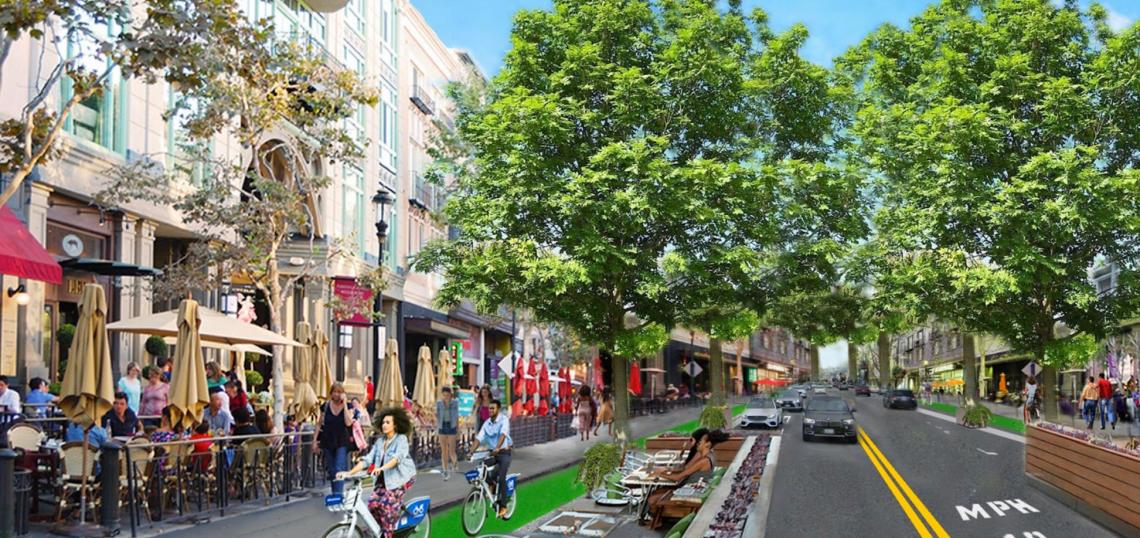In the automobile-dominated United States, the concept of the walkable "15-minute city" may seem like an inherently foreign concept. But it could be coming soon to a Los Angeles neighborhood near you.
At its meeting yesterday, the Los Angeles City Council voted unanimously to adopt a motion to help implement the Livable Communities Initiative (LCI), a proposal which was outlined in Program 131 in L.A.'s recently-certified housing element. The concept, detailed in a late November news release, aims to solve L.A.'s housing, traffic, safety, and climate woes by enabling the development of new mixed-use buildings on key commercial corridors, placing new housing near job centers and transit lines.
As a result of the Council vote, staff from the Departments of City Planning, Building and Safety, and Transportation have been asked to report back within 180 days on strategies to establish the LCI. Staff have been instructed to consider by-right or administrative development and zoning standards to promote "mid-scale" development, meaning buildings between three and five stories in height. Potential strategies include:
- Waivers or reductions of setback, unit floor area, and other development standards.
- An inclusionary housing requirement to increase access to affordable housing.
- A minimum density requirement to promote multifamily, mixed-use development.
- Provisions to encourage greater lot density such as allowing for microunits, shared housing, or increasing floor area ratio allowances.
- The elimination or reduction of parking minimums in "high quality transit areas" or "transit-rich areas".
- Exclusions and/or mitigations for lots located within a Very High Fire Hazard Severity Zone, an identified historic district, or are designated as open space.
- Exclusions for projects that may result in the demolition of buildings subject to the Rent Stabilization Ordinance or the loss of covenanted affordable units.
The report back is expected to also include an outreach strategy to identify target corridors for the LCI, which will be rezoned in concert with the ongoing housing element update. Council direction calls for consideration to be given to historically marginalized, disadvantaged, and underserved communities which would be impacted by the selection of LCI corridors.
The Planning Department, including its Urban Design Studio, is also expected to report on an administrative clearance procedure for LCI projects - including objective design and development standards that do not run afoul of state housing laws. Those clearance procedures would be accompanied by an administrative review process to facilitate investments in public right-of-way improvements to encourage transit use, as well as safety for pedestrians and cyclists.
The Council motion also calls on the Economic and Workforce Development Department and Chief Administrative Officer to report on potential financing mechanisms for public improvement along designated LCI corridors, including social impact bonds or the establishment of enhanced infrastructure financing districts.
The Livable Communities Initiative follows recent changes to state law, such as AB 2097, which prevents local jurisdictions from imposing minimum parking requirements for residential buildings near major transit stops, and other bills which enables the redevelopment of small, narrow lots. The LCI's backers argue that new legislation "democratizes" building, allowing smaller investors to construct housing, rather than larger development firms.
“So many L.A. residents want a beautiful city that’s affordable for their children to live in when they grow up, a city that fosters community and doesn’t force us to spend hours of our lives sitting in traffic everyday,” said LCI Co-Founder Lindsay Sturman.
While Planning officials have their work cut out for them, with an obligation to rezone to accommodate up to 255,000 new homes by 2029 under L.A.'s new housing element, steps to speed up the approval process may assist in the process. To that end, the City Council also voted yesterday to adopt a strategic plan to streamline the approval of 100-percent affordable housing developments through increased staffing and better coordination between the departments involved in the development review process.
- Housing Element (Urbanize LA)






